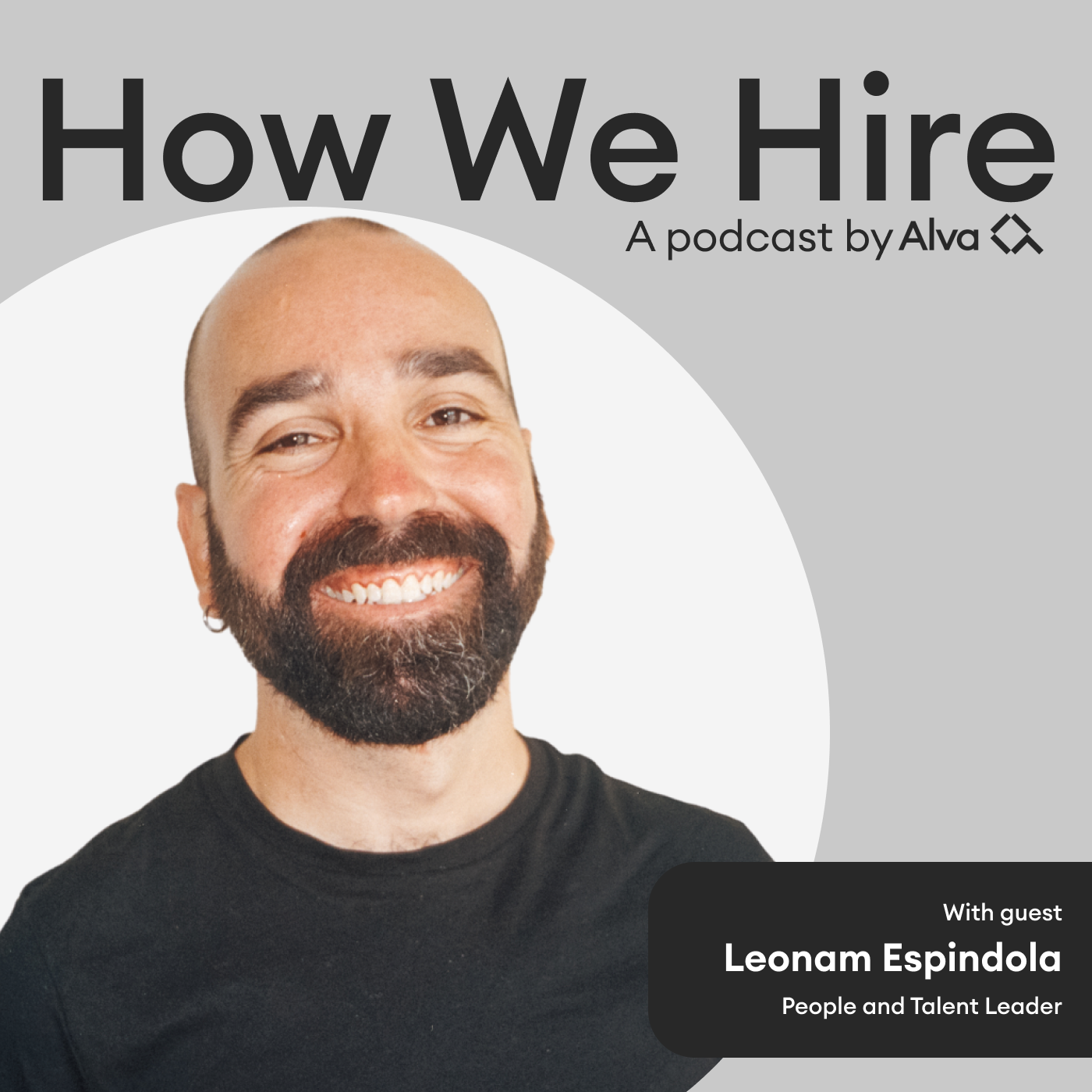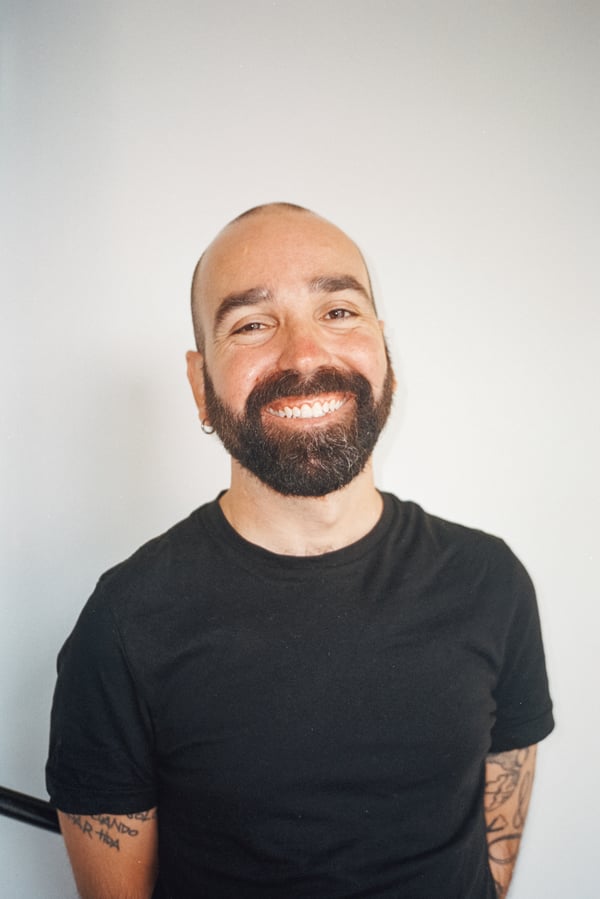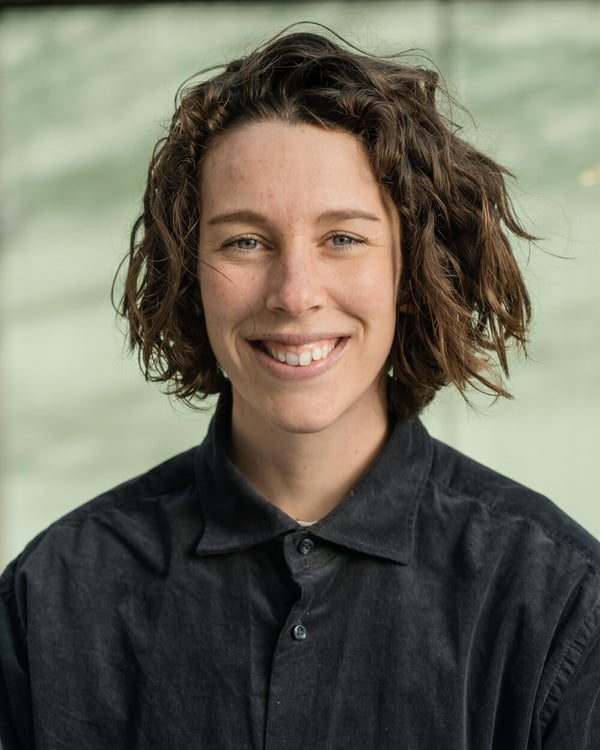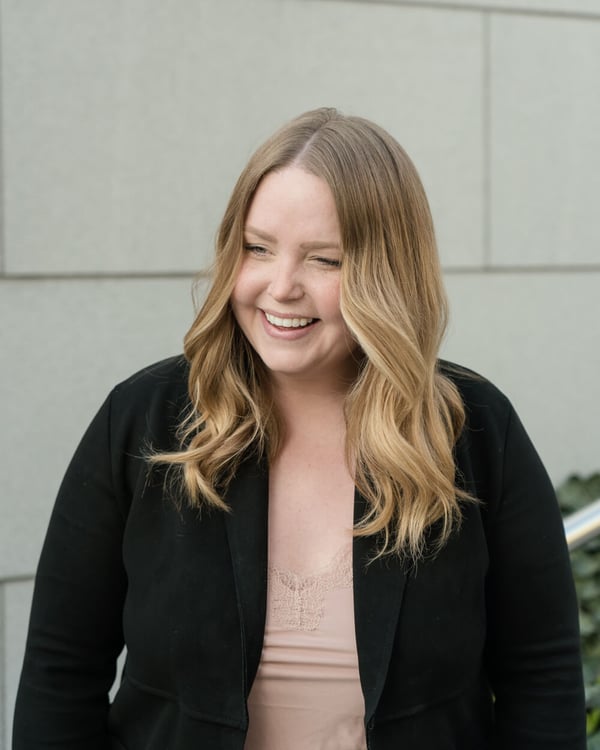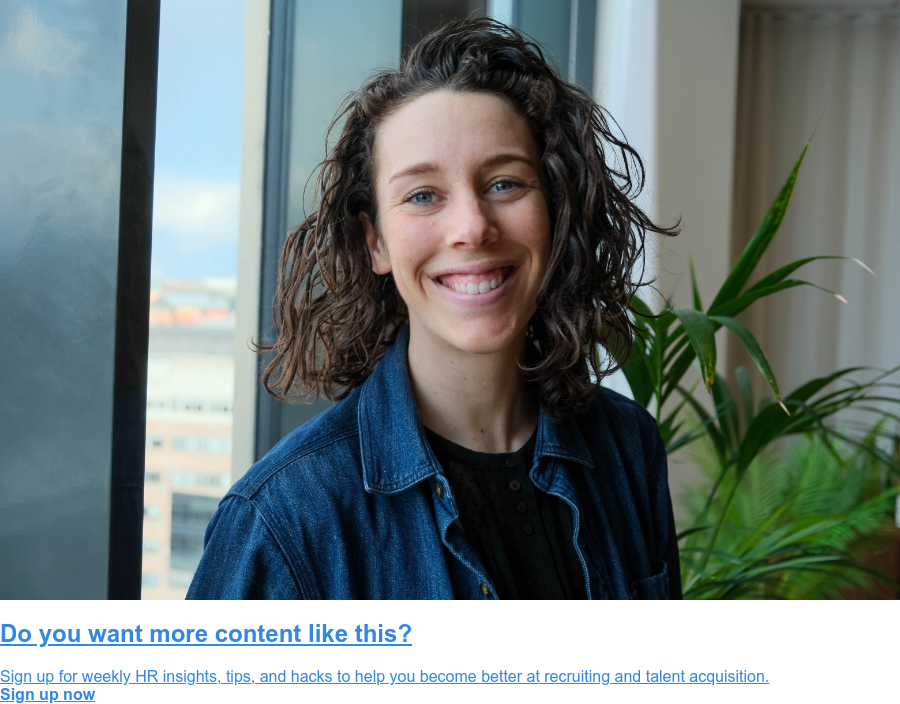Tove Hernlund (00:06):
Welcome to How We Hire, a podcast by Alva Labs with me, Tove Hernlund.
Linnea Bywall (00:11):
And me, Linnea Bywall.
Tove Hernlund (00:12):
This show is for all of you who hire or just find recruitment interesting. Every episode we will speak with thought leaders from across the globe, to learn from their experiences and best practice within hiring, building teams and growing organizations. Welcome to another episode of How We Hire, the podcast where we discuss all things hiring with some of the top HR and talent acquisition minds. I'm your host, Tove, events and community manager at Alva Labs.
Linnea Bywall (00:43):
And I'm also your host, and my name is Linnea. I'm a licensed psychologist and head of people at Alva.
Tove Hernlund (00:49):
And our guest today is Leo Espindola. Leo has extensive and broad experience within talent acquisition and people growth, handling all kinds of intricate people questions in organizations across Europe, South Pacific, as well as the Americas. He's also an Agile coach and an avid believer in a people-first approach. Welcome to How We Hire, Leo.
Leonam Espindola (01:09):
Oh, hi everyone. It's nice to see you.
Tove Hernlund (01:12):
Today we're going to focus quite a lot on ageism as a topic. And before we even start talking about this topic, Leo would you mind defining this a little bit for us?
Leonam Espindola (01:21):
Yeah. I think it's a very good start. I would define ageism as any form of prejudice that's regarding of age one solves inside the workplace, or in life in general. So to me, on a [inaudible 00:01:36], ageism is that, regardless of how old or young you think you are, that doesn't matter.
Tove Hernlund (01:41):
And how come this is such an interesting topic to you or something that you're very passionate about, I should say?
Leonam Espindola (01:49):
That's a great question. I'll talk maybe from a personal perspective and then from a professional perspective. So from a personal perspective, I've been told multiple times in my career that I was either too young or too old for certain roles. And the context has been, I've been into global headquarters and into startups. So things were quite different, so that played roles. And then in a professional sense, most recently I was working for InsurTech that is quite young in age, so the average age of the company is probably 25, which is really young. And I was their talent manager. So basically what I was doing is to recruit and develop people.So ageism is something really important right now into the business society, when we do have 21-year-olds that learn how to code by themselves, but we also have 45-year-olds who are getting money doing podcasts or just creating learning curriculum online. So it's something that I think it's quite exciting from a personal way, but also from a professional way.
Tove Hernlund (02:51):
Linnea, what's your take on ageism? Because this is something that you discuss quite a lot as well.
Linnea Bywall (02:54):
Yeah. I like the approach of the personal perspective and the professional one. Then start with the professional one. We know that if we have a diverse workforce we will get different ideas, different opinions, and that will help us create more ideas and better products and solutions. So we know that it's good to have a larger spread than a lot of companies have. That's the first thing, and also that it is a problem. In the market today a lot of candidates, especially that are too old, won't be of interest to recruiters. But then we also have the catch 22 of you need to have 20,000 years of experience but no one is willing to give you that first job to get the experience. And then from a personal perspective, I struggled a lot with this because when I started working, I worked both with recruitment but also with leadership development.
Linnea Bywall (03:51):
So I spent a lot of time in the classroom training leaders on how to be good leaders, and I was what? 27. And they were 45 or 55, often men, and I had to come in and tell them how to do things differently to be more successful. There were a lot of people not trusting me, especially because I was way too young, because it was really difficult for me to showcase that I actually had something to give and the only thing I could dangle in front of them was my title of being a psychologist. And that sometimes helped, but often wasn't enough. So I think I have struggled a lot being too young, and now I'm in that sweet spot where I'm still almost young but still have some experience. But soon I will be too old, so then I'll battle it again.
Tove Hernlund (04:42):
Okay. So Leo, we know that this is a problem that is creating difficulties both for organizations and for candidates. Why do you think this comes about? Why is this a factor that we need to discuss?
Leonam Espindola (04:58):
If we look at it live, we know that the way that we do business, that we relate to each other, the way that we communicate, is changing faster and faster and faster. So suddenly there is something called B-Reel, which the kids think that that's the social media for the future or a video platform for the future, but not a social media for the future. And that creates changes on consumer behavior, that should create changes in how do you do product development, how do you do growth marketing, how do you do organization development, right? That change is really fast and we can't really predict it.
Leonam Espindola (05:35):
So there's going to be loads of other new things coming up, so ageism is just one perspective. But why I think ageism is a really important one, it's the connection of work matters. We can't fight it because we need to pay our bills. And I know that we can talk about mental health, I know that we can talk about diversity elements, I know we can talk about career development, which is something that always is really great at. But in the end of the day, we all have to pay our bills and we all decide how to do that. So ageism plays a role that my dad, who is now 63, he's a retired man, he just messaged me saying that he wants to begin a podcast, talk about politics.
Linnea Bywall (06:15):
Love it.
Leonam Espindola (06:16):
That's something that we would never think that it's okay. And maybe for us it's like, "But he's 63 and he's retired." But I'm like, "Isn't that great that he's so passionate of sharing what he believes in?" And then at the same time, I have a younger cousin who is 19 who doesn't want to go to school, who doesn't really know what to do, but is really, really passionate about selling things on Etsy, on their shopping platform and so on, because they really like the knit. And in the end of the day, when we are hiring, when I know that soon Q4 will begin and we're all going to go crazy with our hiring goals, we're not only competing within the big techs and the startups and the scale ups and the consultants and the banks, we are competing with individual people that, like me, would wonder why do I really need to put all of my money and effort into 40 hours at work? Does that make sense?
Tove Hernlund (07:13):
Yeah. And I think from the company perspective, why this is a problem is, it boils down to stereotypes that you associate traits. And I think it's a great example with your father. If you're 63, you can't start a podcast because then you're supposed to be a grumpy, old man yelling at the birds. So we have these stereotypes of how people work and that hinders us from seeing the full potential that someone can actually have versus position, right?
Leonam Espindola (07:41):
If we boil the ageism into hiring, if we think about it, when someone decides to ask to be a director or to be an individual contributor or to work four days a week instead of, we should find our ways and our tools into making sure that we can have a fair assessment and we can actually enable them to reflect and to have an authentic answering to that question, why title doesn't matter to you? Is it because you want to change industry? Is it because you just want a new gig? Is it because you need to pay your bills? And what I'm doing here is going to compete to that, both from a power perspective and from a business perspective.
Tove Hernlund (08:19):
It sounds like we need to be more open about the candidates we're competing with more than just other companies. We're competing with passion of the individual, but also that we need to then assess candidates in a way where everyone has room to be themselves. Does that make sense?
Leonam Espindola (08:38):
Yeah. It's the B-Reel approach. It's something that I've been... I went for a coffee this morning and I was thinking about something that a recruiter told me yesterday evening. That recruiter was really stressed and tired to finish their Q3 hiring goals for engineering, right? It's a reality for most of us. She was so tired and she was so honest and she was like, "It doesn't matter if you're B2B, B2C, where you are in your business, in the end of the day it matters if you're being human to human, right?
Leonam Espindola (09:06):
And in the end of the day, of course structural based interviewing matters, but in the end of the day, the world is changing so fast so its way's more important for us to then go through a competence assessment into hiring for potential, hiring for growth, hiring for [inaudible 00:09:21], hiring for networkers, instead of do you have five years of experience drinking water. Because drinking water, which is any requirement, while they think it's important, doesn't matter because the world will change best with a new trend that is coming up next week when Rihanna launches a new song, Beyonce decides to stop doing music or whatever it's happening to the world.
Tove Hernlund (09:43):
So it's really hard to nail down what's going to be important now because we have no idea what's coming next.
Linnea Bywall (09:49):
Do you also think that there's, and I'm asking this question to both of you, I guess. The reason ages is such an easy topic to discuss, is that also because we can all relate to it. Because other forms of isms, if you're born a certain way, you're going to be exposed to certain parts of the isms. But ageism is something we can't avoid. None of us can avoid it. So is that also why this is a topic that people are discussing so much because we realize our own vulnerability in that if we as three semi young people sit here and discuss it now, we all know that in 30 years we're going to be those 60 plus year olds that people are questioning if they should start a podcast or not. Is that also part of why this is such a hot topic right now, you think?
Tove Hernlund (10:37):
I think this is a great hypothesis. I'm like, light bulb. I think it makes sense because to some extent it's a more neutral area than a lot of the other discriminating factors that are happening in the workplace in the hiring processes, because we have all been too young and we will all be too old unless we actually view talent differently. And I think to some extent, that is happening but there's still a long way to go. So we're all going to be victims to ageism in some way.
Leonam Espindola (11:09):
It is something with the future, right? So we had no idea two and a half years ago that a pandemic would disrupt our society just drastically. We just don't know what's going to hit us. And then ageism in plays a more role because we want to belong.
Tove Hernlund (11:25):
In your mind, based on how you have done things in the past and how you have seen other coworkers done things, what can a company, a recruiter, a hiring manager do to reduce the risk of having ageism influence their hiring process?
Leonam Espindola (11:41):
My framework starts with, does it matter? And it's the awareness perspective, if we're more sensitive, right? So awareness comes from pure data. So it's ensuring that we have potential hypothesis to be born. So as Linnea said, does didn't matter for our business that all of our development team it's a bunch of 21 year olds? For some business, it truly doesn't because for some business, they truly only have the targets generations as users. For most of us it matters. And then if we know that it matters, then I think it's something around engagement. So my recommendations for anyone who wants to go deep this topic is drive conversations and align language with your executives. It's not a top down perspective. And the folks know me know that I have a lot of [inaudible 00:12:37] authority. It's about, those are the decision drivers of your organization. Either you are in Sweden and you believe in flats or not.
Leonam Espindola (12:45):
Because that's what you have achieved on your title. So it's really important then within the CPO then the CMO, they feel comfortable, is this okay for us to talk about? And then it's acting, right? So essentially, perspectives of making sure that you do have a psychometric assessment, that you know how to use it to avoid unconscious bias, making sure that you know how to go and attract different under privileged societies or under represented groups in your workforce and actively, and that's just my opinion, push adding power change. So if we've agreed that our leaders are in their early thirties, if I need to hire and you had a product design, which a lot of us are, I can decide truly if I think it's more important to compare candidates into only that field or into this field and to have a field onto, if you are a little bit more experienced in life maybe that's just going to give you one extra point. Do you know what I mean? When you're assess. But does that make sense on your experience?
Tove Hernlund (13:50):
Yes. I think it makes a lot of sense and I really like the part of knowing or deciding if this is important and why.
Linnea Bywall (13:57):
And I think what I would like to add is obviously treating all candidates the same, but that's a given for any isms we're talking about. So that goes without saying, but I still said it. But I think there's two things that I want to add. The first one you touched upon it, which is employee branding. Because to be honest, Alva, we're quite a young company going from what? 25 to 45, which means that we are missing a big chunk of society when it comes to age. But it's also really challenging. We're still quite a small company, statistically would be impossible to have representation of everything here. But it is a matter of looking at your employer branding. It's very likely that the pictures that we present on our career page, it's only pictures of us so obviously it's going to look like we're only young people because we are quite young, which will most likely attract younger candidates.
Linnea Bywall (14:57):
So I think there's something around employer branding. And then one topic that we have discussed a lot lately is, given that we are quite a young group of people, young leaders, inexperienced leaders, we have challenged ourselves to this year, every hire that we make should make more money than yourself. And I think it's such a, maybe dumb concept, but to me that landed really, really well. Because if I'm the hiring manager and I'm not comfortable with hiring someone that's more senior than myself, even if that is just because I'm scared that they're going to be better, I don't want them to have more money than me, it doesn't matter. But then I'm the issue. So there's also something around, if we want to increase seniority, it doesn't have to be just number of years, but if we want, there's people we're going to have to pay up and they're going to be better than you and that's great, but we have to acknowledge that fact. And I think that can hurt someone's ego sometimes, but it needs to be done.
Leonam Espindola (16:04):
I think that's such a good example. If I just may add up a story that happened to me a couple of years ago recently. I was partnering with someone on a project and they were way more experienced and senior than me, but it was the first time that they were doing that job and it's something that I've been working for 10 years, and it was another male. And we were just crashing at work and we had to be really close into making sure that employer branding was something that we were acting upon. And then it was so interesting when a friend of mine came to me and said, "But Leo, with your personality, don't you think that maybe that person is feeling a bit scared of you because you are younger and you have more experience though?"
Leonam Espindola (16:45):
And that's also class of ageism in that perspective, right? I actually came to that person and I told them, "I'm sorry, that's how I communicate, so sometimes... I'm Latino, so I'm very passionate. At the same time, I'm here to help. So you can balance ideas." So creating the safe space for even older people that may not have the experience within tech that maybe we do, but they have other business or leadership experience and give them the space of flourish. It's really hard because in the end of the day we don't have time. And I think that those conversations are really important.
Linnea Bywall (17:19):
Yeah, I very much echo that one. And I think just say it out loud can take away a lot of the shame. I have a similar example where I was supposed to lead a coworker. We technically have the same role. He was more experienced and honestly better than me. And it was weird until we had that conversation where I could just be like, "Hey, I understand that this is strange." And after that, as long as we had just said it, things worked much better. So I think there's something around that. But I also want to dive on, you just said tech. We have been talking a lot about new trends and how that impacts society and people. So when it comes to technology and ageism, what's your view on that?
Leonam Espindola (18:05):
Something that comes to my mind when I think about technology is I think about platform and then I think about enablements in different ways. So platform to me are tools that make sure that we have infrastructure. A lot of us call it awareness. Enablement it's engagement. It's actually using them for something and learning how to. So in the first step, when I think about ageism, I do think about from your people stack to begin with, right? So depending on the solutions that you have, which solutions do they... What is their approach with ageism, right? So if you have something around learning and development or something around your ATS, do they have some sort of feature on that?
Leonam Espindola (18:48):
And there's loads that do, loads that don't. And then when we think about the engagement perspective within technology, I think that I would say it could be a legal thing that I think you should talk to some other folks on your teams like, "Okay, we know that we have this data, right? We have these beautiful reports that we show to the board. What do we do then about it, from a technology perspective? Then when we hire, what can we do to make sure that we attract more diverse candidates?" I don't know. What we do then when we need to develop them? So when we do to upskill, to [inaudible 00:19:22], to, how to you call? Upward management, as you said also Linnea.
Leonam Espindola (19:28):
All of those things, they play huge roles that I think technology can support leaders instead of us flagging things, losing our voice, coaching on the ground. I think coaching on the ground... I can think of the sustainability of having one-on-ones. I keep thinking of my time, I keep thinking of your time. If you need to scale a business, I can't be on the ground all the time and support your leadership development or even hiring. So what can we automate? What can we do to make sure that the systems and the networks of the organization actually have the culture of oh, you're 51 or you've just turned 50, [inaudible 00:20:07] birthday. Congratulations. What do you think is happening in the world right now?
Tove Hernlund (20:12):
So if I understand you correctly, making sure... Because we're talking about two things here. We're both talking about ageism in the hiring process, getting the people in, but we're also talking about ageism at the workplace, meaning leveraging all the different candidates that we have, making sure that people can belong. And technology could be a way to ensure fairer processes once people are in the organization.
Leonam Espindola (20:37):
And maybe that's a great input as well because I don't believe in running talent acquisition as your sales folks [inaudible 00:20:45], thinking of talent management. I just find it really silly if an organization has a hiring plan just because, and it doesn't connect to career progressions, it doesn't connect to the business input. What would that developer actually support growth with? And if you don't know, but your board, once it's above 10 people, it's okay. But then you know that that's the case. And then coming to the ageism perspective that you mentioned Linnea, I think that the technology is things like Slack. Slack is culture, because culture is relationships.
Leonam Espindola (21:17):
The way the kids in the texting have done it for years, either we like it or not, it's to react to things, is to repeat things. It's the gratification society, remember. So it's the now. And if we are a bit older or if we're really young and we don't post so much on Instagram anymore because it's not cool, we have to think about that. How do we engage people then to understand that if most of the organization is our ages, the three of us, then it's expected that you're going to give that thumbs up. And if you can't because that disturbs you at work, it's also okay but then we have to say it out loud, which I think that creates overall inputs from everything that we said.
Linnea Bywall (22:03):
I think this is great input when it comes to that.We just need to state how we work together, super transparent with what are the expectations. Because I think Slack is a really good example where... I've onboarded a lot of people in the last year and a half and people relate so different to it. Some will use it as a live chat, they will always be on. That might not be that great because they need to take some time off sometimes. And then some people will be super strict and notifications off. And both, as you say, are fine, but there can be a clash. So how do we do things here? And we try to be clear with it, but I think there's so much more to be set as you said, do you need to push the little heart emoji when someone says something or not? It's something that you learn with the culture, but we can be way more explicit with it. So I think that's great. Great point.
Leonam Espindola (23:01):
And you know something that came into my head now, if you look at the hiring perspective again of ageism, it surrounds benefits. So the older I get, the more money I receive, the more I think about my time, right? And hopefully and the more I think about benefits. And it's a great element of employer branding, but of internal narratives on why you believe in certain elements of your benefits to the packages. So for example, a great example of 35 year olds right now is that loads of them in the heteronormative society are having babies or they need to pick up their kids, they want to have time to see their kids growing up. And our parents actually did this, right? That's beautiful. Then we do need to think about, in our culture, in our business principles, what we believe in that people should be online or not, or in the office or not.
Leonam Espindola (23:56):
And that is something that if I'm a candidate, I know I don't have the data, but I know the loads of people would actually care more than maybe even something else because they're in that life moment, that's something really important to them. So that's just one scenario. When I think of the other scenarios that are not the mainstream, right? So someone on their fifties that do want to fish a little bit or someone who on their... Literally I was working now with a great 21 year old, and he hasn't even gone to school. What are the benefits of a 21 year olds into the workplace to catch you in your hiring for you to... Again, they can get paid playing video game. So much more money than what we can afford it.
Leonam Espindola (24:43):
But if you don't take that as a principle to your board meetings and into your leadership discussions, it will not matter. And then you just have to be creative. And I think that being creative doesn't mean it's about money. So it is about, can't you try a four days week? Can't you try workspaces or tools to just show to people that you're trying., You don't have to go on a PR media. Looking at companies last week that have done that in Sweden very openly and saying you have to be in the office four days a week. You're doing this because it's a PR move, but why don't you create a culture that people, they try. And we don't know because I don't know if there's going to be a new pandemic hitting us [inaudible 00:25:25] going to have to go back to the office. That makes sense.
Tove Hernlund (25:28):
Yeah, it makes so much sense. And I love that we ended up here because I think ageism, from my initial perspective, it's so much like hiring. But then I think what we showcase here is that it's so much more complex. And we have been, internally at Alva, been in so many discussions of what's our benefit package? What do we optimize for? Because it's impossible to optimize for all categories of age if we now stick to that.
Linnea Bywall (25:57):
Because if we have more senior people, they will most of them, maybe focus more on retirement and pension compared to if you have 21 year olds. And it's, I think, just funny how the company grows. When I joined we had lower pension and now as we're getting older, it was like, "let's start increasing pension." It's evolving with us. No, but I think it's impossible to have a benefit package that you can't have unlimited vacation and the highest salary and the best pension and the best, et cetera, et cetera, et cetera. There's no way. You have levers that you can pull and you're going to have to optimize for as many as possible, but we can't do everything. And then I think that's also places, who can you attract? How will that change? I don't know, now I'm just babbling on. But I think it's really, really interesting from this perspective.
Leonam Espindola (26:49):
And I think that that topic as itself, it's a topic that I would love for us to have another chat in the future because I think [inaudible 00:26:56] can be so squared and boring when I actually think it's the most exciting topic.
Linnea Bywall (27:00):
It's so exciting.
Leonam Espindola (27:02):
And it's something alive. So I've seen a job ad this week that they said that they give you a bike. And I'm like, "I haven't thought about this before." Because a bike doesn't cost a lot of money. A lot of folks really like to have a bike. So you can actually-
Linnea Bywall (27:14):
Yeah. I would love to have a bike.
Leonam Espindola (27:18):
So to be sustainable, to have an opinion around [inaudible 00:27:21] in the world, right? And isn't that more creative? Isn't that there's a voice? Your ping pong tables and your basic compensation benefits that everyone is copying everyone, they're so bad. And it's so fun that I'm talking about this company now and there's loads of things that we know there's financials behind, right? But again, we can be creative. And then coming to the ageism of the perspective, it matters that I would love to challenge organizations who are listening to this right now to stop their Excel sheets and not just talk about ageism, but act on ageism and money.
Leonam Espindola (27:53):
As you always say Linnea, people work for money, but we don't want them to work for the money and we don't. But they still should work for money, if that makes sense. So we don't want people to be here because they want to be tied or to say, I got an offer and I need ten thousand crowns more a month. If someone tells me, I'm like, "I'm sorry, we have a range and we have structures into how we promote and hire. If that's the most important thing to you, go ahead. I can try to talk you something or I can try to give you something else." But I think that those kind of things, it's things that I'm not seeing a lot of our HR leaders discussing. They just discuss the isms, as Tove said, as a concept without talking about the business and the business is how much you're growing.
Linnea Bywall (28:36):
Yeah. And going back to employer branding as well as you spoke about before. If you can tie in that you're a sustainable company by also getting all your new employees a bike so that they can choose a sustainable option to get to work, it goes all the way from, we talk a lot about sustainability, but this company actually acts on it. It's a really, really smart way to get everything aligned.
Tove Hernlund (29:00):
I'm going to go bike shopping right now. But Leo another part of the texting, to kind of go back to that question that Amy asked, HR Tech as such. Now we spoke a lot about what you can do once you're actually employed, but during the selection process, what are your views on some of the new HR tech? In terms of being able to apply anonymously or being able to do all of these things that you can now do quite easily, what are your thoughts on that? Do you think that's enough to help us battle ageism?
Leonam Espindola (29:31):
It's a good start. I think that there are elements in technology that it's just a good starters. So when you are a product led organization, you believe in your product strategy to drive growth, right? A product strategy or product roadmap is just a framework to begin a dialogue, it's not what's going to happen. If you are as a sales or marketing led organization, you believe in your distribution model, how do you do brands, how to do content, all of that doesn't mean it's going to grow, but all of that will generate dialogues. Then if I look at your HR, your people strategy when you have one, you should start by something. So you should enable it. So I don't believe you scale a business by doing one-on-ones. I believe that you have to have a people stack, an HR tech. So that means that you decide which kind of technologies you have and then you try.
Leonam Espindola (30:25):
So every organization is different. So for some organizations, having an onboarding platform makes sense, or even in the assessment perspective where we talked about, maybe makes sense to... I'm even going to challenge you guys. For some organizations maybe not having a psychometrics makes sense. That's what they think it doesn't make sense. Do you see? And then if you're truly then evaluate and assess their process, you're actually going to see, this is not a paid post, that [inaudible 00:30:55] psychometric solution, it's really important. But it's not important just to tell you that you'll have a partnership, that you are having a conscious bias, it's important when you fire people. I know that Linnea wrote about this really from the post this week about laying off. It's important that when then you're hiring, you look at candidates and you're fair into their assessments regarding of the isms that they have.
Leonam Espindola (31:20):
And then in the ageism perspective, you understand what is the potential that they may have, what is the performance they have shown in the process. And they can be 21, never went to school, or they can be might as well my dad, who now has a lot of time, who wants to do a new gig and support an organization just by, I don't know, fishing [inaudible 00:31:40], you know what I mean? So I think that technology is for me, a way that HR should learn how to drive a conversation and then try it and fail. I'm sorry HR leaders, we need to fail, we need to be comfortable with truly saying, I'm fucked up. Sorry, but I did not do a good layoff. That hire was long rates. Last month, our budget did not do well. Because that's what sales gurus do, that's what good markets gurus do, that's what good product leaders do. And they don't take blame for themselves, they just say, "That's what I've learned, let's go and try something new."
Linnea Bywall (32:17):
I think that's a really important way of working. But then if I understand you correctly then, using tech in a good way can be a starting point and it can be helpful. But as I read it, it's also about going back to why do we do it? What's the purpose of it and how will it actually create a difference for us?
Leonam Espindola (32:38):
And beginning dialogues, right? So it's also to me the perspective of okay, we've implemented a psychometric solution, right? I swear to God, they do not pay me. But okay, we did it. Did we do it because everybody's doing it or did we do it because that's increasing the time to hire or the probable hire? And I know that we can answer that. And we might as well then decide if it's the right tool, if it's an arm tool or it might decide to cut the part of the process. Why do people need to code? Why did I spend six hours doing a case for a certain organizational there who talks about they're so diverse, but then they gave me six hours to do really strategic case and then they told me that I'm too senior for a role but the case was really strategic? Technology should support and maybe give you insight into those things, tight? Time is money.
Tove Hernlund (33:26):
Can I just jump on this because I think this is a really interesting topic around the fact that, I doubt that people will question you're too junior for a hire. I would want to question that more, but I think what's really interesting is when someone says that you're too senior for a hire. Ageism at it's finest, because you're too good. Why do we so often end up there that we reject great candidates because they're too senior for the role? What's your take?
Leonam Espindola (34:00):
So I am too senior for roles, what does it mean to me is you don't have a leadership culture that you're truly developing your leaders. So hear you're saying that you are an insecure leader. As you said Linnea, if I hire... Let's say I'm going to hire a product designer, right? It's a role that's very important this days. I hire a product designer, they decide to apply. They have 10 years of experience. They know the average pay of their role. It's fair. They want to do it. They do a process then my manager looks at me and say, "But they are going to be too bored here or they're too senior for this." To me, that says that you are not hiring for potential, you're not hiring for context and adaptability. Because that person is taking and being willing and humbling enough to join your problem space, your culture and helps your leader who thinks are so great into your requirements, learn with you.
Leonam Espindola (34:59):
And that is a great hire for potential, truly. Because really, who knew that we had to lay off so many people this year? Who knows how next year we're going to have to be efficient? So if we can hire someone who has so much skillset, even though they're too senior, isn't that a beautiful dream? Then why do you have three juniors? If you have to cut budget, take that person. Linnea also said something, which is great, last week. We know that I think 5% of the workforce represents a lot of the business outcome that we do, right find them, scream at them and take them with you. Because in the end of the day, those 10% of people are the people that are driving a business and are the ones that are supporting your culture, are the ones that are enabling your organization. And a lot of those people even have something common. It's their natural drive, if their perspective of, I've adapted to myself.
Linnea Bywall (35:57):
Okay. I have two things I want to say. First, the numbers that you refer to that 5% of your workforce stands for 26% of your output. Mind blown. Second, mic drop on that response Leo. I think that's really, really good. No more, you're too senior for this position. Just be freaking happy that they want to work for you.
Leonam Espindola (36:19):
Give them that job and focus into creating a space that you can actually nurture growth instead of being obsessed with your own bias and go to therapy... Your own rejection, right? They will take my job, they will be too bored. Someone told me that I will be too bored at a job. Yes, I get bored in jobs very easily. It's your role as a leader then to channel me, take the best of me. And that's not just me, it is with your juniors. And if you're not doing that, your juniors will leave you as well.
Linnea Bywall (36:54):
Yeah. Another mic drop.
Tove Hernlund (36:56):
Yep. Love this. It's time to wrap up, but thank you so much Leo, for joining us and for dropping some proper two... It's time to wrap up. Thank you Leo, so much for joining us today and for dropping some real truth bombs. I think this has been a super interesting episode on ageism here at How We Hire. Me and Linnea will release the next episode in two weeks. Subscribe to our channel so you don't miss out. Thank you so much and we'll see you next time.
